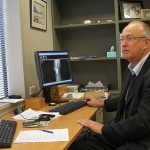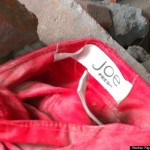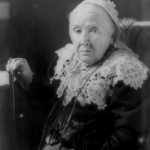
Features

The new virus seems deadly but not particularly contagious.
by Daisy Sindelar
It’s been a decade since severe acute respiratory syndrome, widely known as SARS, swept through Asia and beyond, killing some 775 people and raising fears of a global pandemic. Now health officials are expressing alarm about a similar virus — called novel coronavirus — that emerged on the Arabian peninsula last autumn.

Family man in prison finds the words to bring his wife and daughter to his new country.
by Stephen Kimber
[Editor's Note: One of the things we tend to forget about clandestine intelligence agents is that their world really is clandestine. They can't even tell their families or closest friends what they're doing. When René González "stole" a plane and "defected" to the US in 1990, Cuban authorities told his wife Olga he was a traitor. It took four years of pleading and cajoling — still without telling her the complete truth — before René was able to win her back.
In honour of René Gonzalez's final return to Cuba last month and of Mother's Day, here's a short excerpt from my upcoming book What Lies Across the Water, about the Cuban Five, five intelligence agents Cuba sent to Miami to infiltrate the anti-Castro groups trying to bring down the Cuban government.]
Miami, May 24, 1994
René González looked again at the words he’d just written. It had been three years, five months and 16 days since his “defection” — three years, five months and 16 days since he had last seen Olga and their daughter Irma. Despite the time that had passed, René could still feel the righteous sting from that first letter Olga had written him. It had arrived about a month after he’d landed in the United States.
He’d gone to Miami for a weekend visit. His grandmother telephoned from Sarasota. “You have a letter,” she said. “From Olga.” René had rushed back, excited, eager, torn open the letter and… found himself “torn apart.” “I wish you luck in your new future,” Olga had written, “but it will not be with me.”

Corporate greed makes disasters like the recent Bangladesh factory collapse almost inevitable.
by Jim Hightower
You see the clothes in stores across our country and around the world: colorful and stylish clothing with happy-sounding brand names like Children’s Place, Papaya, Joe Fresh, and Mango. But you don’t see the factories where these cheerful garments are made. Nor are we shown the strained faces of the impoverished workers who make them, paid little more than a dollar a day for long, hard shifts.
We only catch a glimpse of the grim reality sewn into these happy brands when yet another factory is in the news for collapsing or burning down, bringing a grotesque death to hapless workers trapped inside.
Continue reading »

The First Mother's Day declaration was a passionate demand for disarmament and peace.
by Julia Ward Howe
Arise, then, women of this day! Arise, all women who have hearts, whether your baptism be that of water or tears!
Say firmly: "We will not have great questions decided by irrelevant agencies. Our husbands shall not come to us, reeking with carnage, for caresses and applause. Our sons shall not be taken from us to unlearn all that we have taught them of charity, mercy and patience. We women of one country will be too tender of those of another to allow our sons to be trained to injure theirs."
No one wins a race to the bottom, not workers and not the Earth.
by Tzeporah Berman and Steven Guilbeault
There was a time when you wouldn’t walk into the local union hall wearing your organic cotton “Save the Whales” t-shirt, and also when you probably wouldn’t take part in the local Earth Day parade wearing a hard hat and well-worn safety boots. But fashions change and so do perceptions. Union members and environmentalists have discovered they have much more in common than anyone once thought.
Emissions losses in tranmission estimates climb from negligible to nearly ten percent.
By Stephen Leahy — This is the first part of a two-part series on methane emissions in British Columbia.
Methane emissions from British Columbia's natural gas industry are likely at least seven times greater than official numbers — blowing BC's Climate Action Plan out of the water. Natural gas is nearly all methane, and since methane is such a powerful climate warming gas, these unreported emissions mean the total CO2 equivalent emissions for the entire province are nearly 25 percent higher than is being reported.
The province's legislated climate plan is to reduce CO2 equivalent emissions (CO2e) 33 percent below 2007 levels by 2020. The booming natural gas sector may make that target an impossibility.
Continue reading »

Thatcher-style attempt to crush unions would leave Canadian workers powerless.
by Linda McQuaig
The willingness of much of the Canadian media to go along with the Conservative narrative about Stephen Harper’s “moderation” has allowed the prime minister to wage a discreet class war against working people without attracting too much attention.
Canadians don’t like Harper’s anti-worker agenda — when they notice it. That’s why there’s been such a huge public outcry since the Temporary Foreign Worker Program was exposed as a mechanism by which the Harper government has flooded the country with hundreds of thousands of cheap foreign workers, thereby suppressing Canadian wages in the interests of helping corporations.

Grand Challenges Canada stimulates and funds new approaches to health care.
by Stephen Leahy
UXBRIDGE, Canada, April 30, 2013 (IPS) — One, two or more of the 102 newly launched out-of-the box ideas to improve global health could be world-changing breakthroughs.
It might be someone’s idea to create a test strip you touch with your tongue to see if you have a deadly disease. Or a mobile phone game to prevent HIV. Or the idea that untreated human waste from slums could be turned into marketable products.

Meet Stephen Poloz, and some hints about how he will respond to key issues.
by Armine Yalnizyan
1. He’s Number Two:
Stephen Poloz was widely acknowledged in economic and political circles as the second-best choice for the top job at the Bank of Canada. So the surprise was not that he was chosen. The surprise was, Why Not Tiff Macklem? Will someone please find out and tell the rest of us?
2. Doctrinaire [or not?] on inflation targeting:
He thinks controlling inflation is “sacrosanct.” Having studied with monetary policy guru David Laidler at the University of Western Ontario, and been part of the Bank of Canada team that brought inflation targeting to a neighbourhood near you, he got the religion all right. Believers are more inclined to see a “rising inflation” problem that isn’t there. The hazard: Pulling the rising-interest-rate trigger too soon and choking off recovery.
